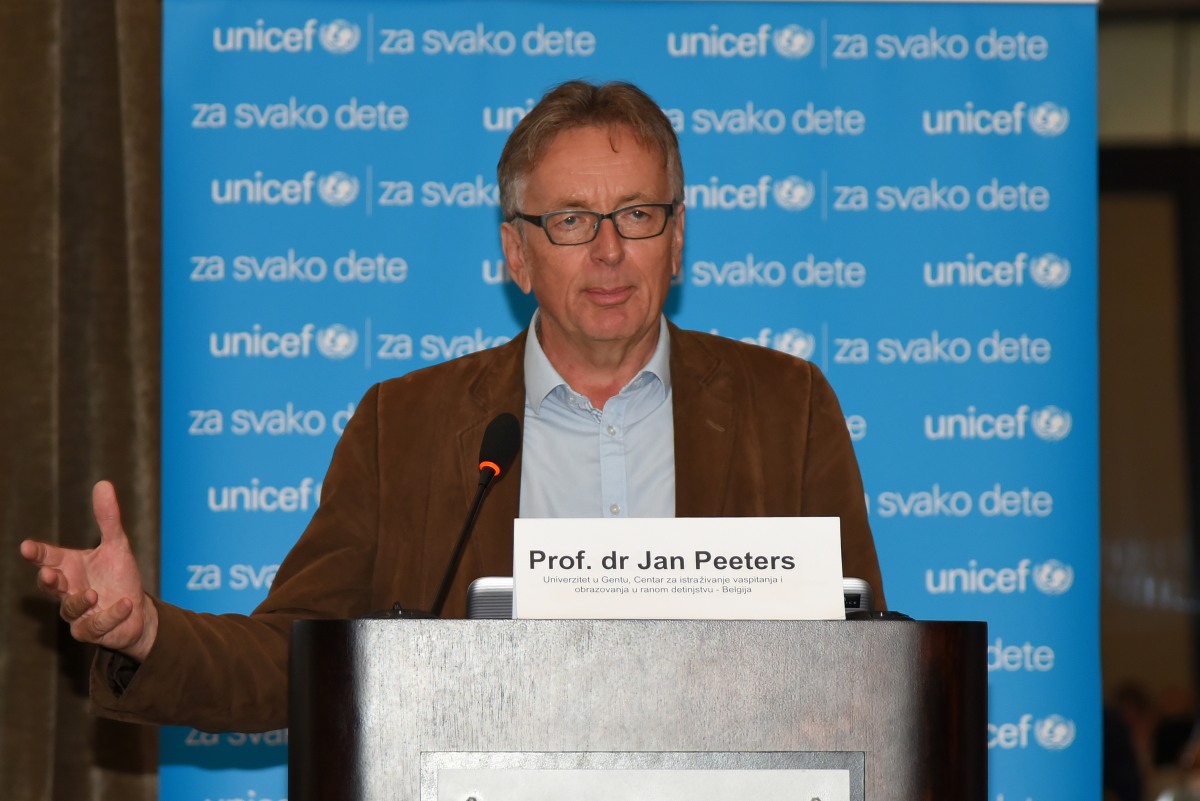Serbia significantly lags behind the EU countries when it comes to participation of children 4 to 6 in the early childhood education especially among vulnerable ones. Therefore, there is a need for a policy towards equal access for all children. It is good to know that the Serbian government has concrete plans to increase the number of children enrolled in kindergarten.

Prof. Jan Peeters Director of VBJK, Centre for Innovation in the Early Years, at Ghent University Belgium has recently been a lecturer at the conference “The key dimensions of quality in the development of preschool education: Basic program of preschool education” in Belgrade. On this occasion, we talked with him about the importance of education at an early age.
What characteristics should the professionals working with pre-school children possess?
Being competent to work with preschool children cannot simply be understood as an individual responsibility of the early childhood education and care (ECEC) practitioner. On the individual and team level the following broad competences are needed when working with a diverse group of families and children: practitioners need to have an openness to dialogue with parents, colleagues and children on the basis of reciprocity; they need also to have an engagement towards children from disadvantage background and they need to have the ability to work towards social change. Practitioners and directors need to have the ability to reflect critically on the own pedagogical practice and that of the team and the institution and they need to have the ability to create new pedagogical knowledge and practices.
You have been involved with several projects that concern Serbia. What do you think are the biggest challenges in our country in terms of pre-school education?
Enrollment in ECEC in Serbia is significantly lower than in other EU countries. For year 2012 average participation in 28 EU countries for children from 4 to 6 years was about 94% while in Serbia total participation of children in that age cohorts was about 74%. And the enrolment rates of disadvantaged children and children living in rural areas is much lower than 74%. So there is a need for a policy towards equal assess for all children. But the government has concrete plans to increase the number of children enrolled in kindergarten.
The ECEC in Serbia has also strenghts , there is a long tradition of ECEC and also a high level of qualification, compared to some other European countries. But there need to be invested in more child centred approaches in the initial training. There is also to much focus on theory and not enough practice in the initial training. From recent research we know that a balance between theory and innovative pratice is essential for a high quality initial training. Another strenght is a new quality framework for ECEC that is being developed. This can create in the future a new framework for the initial training and for the continuous professional development. Another chalenge is the decentralisation of the policy towards ECEC. Not all the local governments have to capacity to develop a policy towards ECEC.
Is it possible to have top professionals working with children in a society that allocates rather insignificant funds to this cause?
It is essential that the govenment invest financially in quality ECEC, if not then it will be the children that are the victimes, because lot’s of parents will not be able to pay ECEC on the private market, or it wimll be the practitioners who will be the victimes because of low wages, or parents who have to pay to much. Or like it is in some countries , all three will be victime of a non investment in ECEC.
How important is our approach to pre-school learning for preventing children from droppping out of school at a later stage?
From a study on the role of quality ECEC in preventing early school leaving commissioned by the European Commission (2014) we know that the competence that the social competences that children learn in ECEC are the competences that early school leavers are missing. ECEC is the basis for life long learning and the first experiences that young children have towards learning in ECEC are very important for their attitude towards learning at a later age.
Also, how important is the approach to pre-school learning for choices we make later in life and especially for children from vulnerable groups?
The European Commission has recommended that Member States ‘reduce inequality at a young age by investing in early childhood education and care (ECEC)’ and ‘revise and strengthen the professional profile of all teaching professions and prepare teachers for social diversity; deploy special cultural mediators and role models to facilitate the integration of Roma children and children with an immigrant background’ (EuropeanCommission 2013, 2.2). Through this important recommendation, the Commission strengthens the broad consensus that already exists among researchers and international organisations (OECD 2006; UNICEF 2008) that the quality of ECEC and ultimately the outcomesfor children and families – especially for those with disadvantaged background1 – is dependent on well-educated, experienced and competent staff.